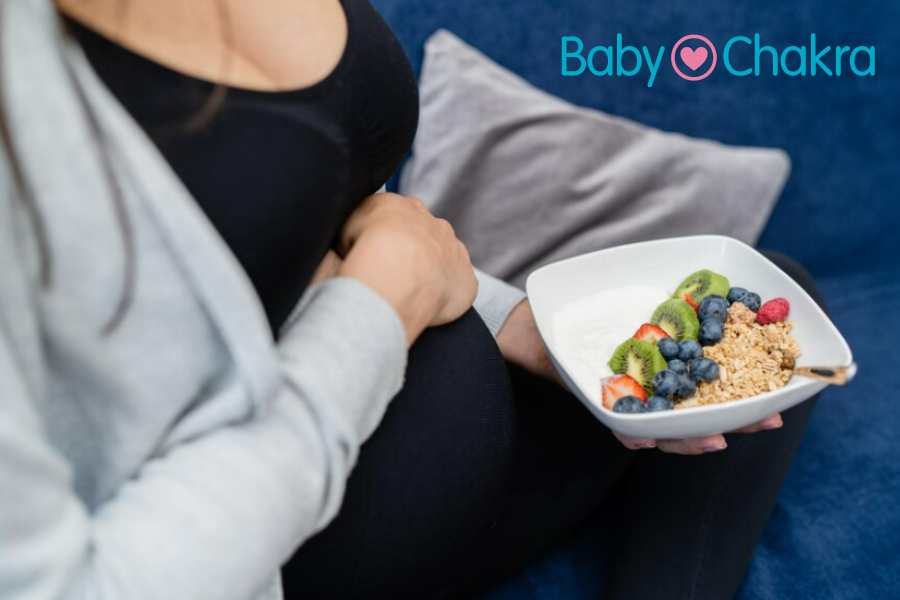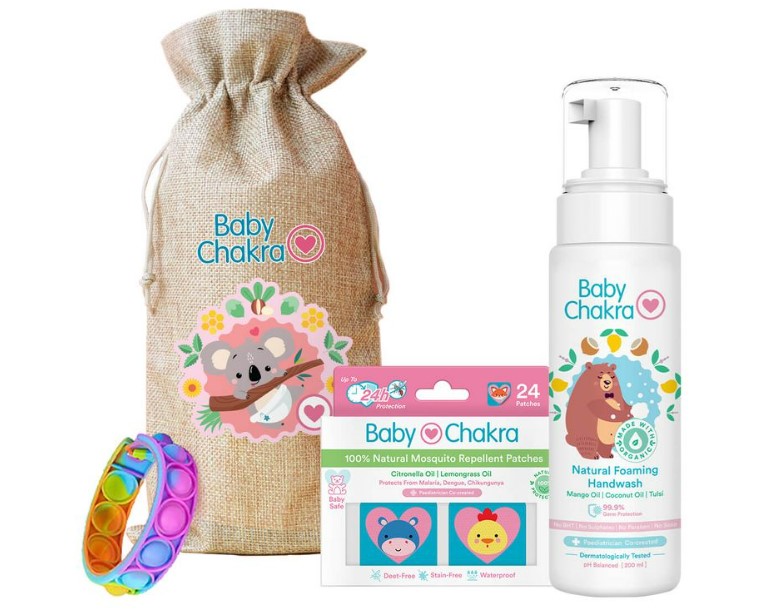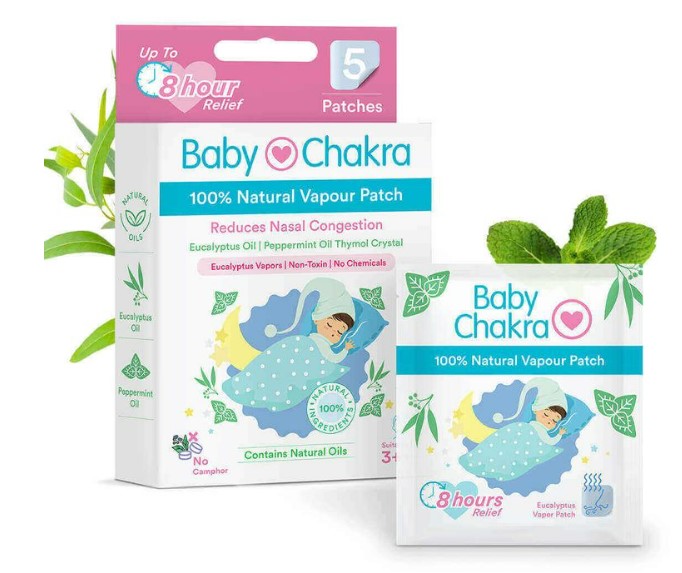
Eating Kiwi During Pregnancy: Benefits, Side Effects, And More
15 Nov 2022 | 6 min Read
Sudeshna Chakravarti
Author | 799 Articles
Kiwifruit, also known as Chinese gooseberry, is a juicy fruit, enriched with vitamins C and E, folic acid, trace minerals, potassium, and fibre. It is also packed with antioxidant and anti-inflammatory properties and has several health-promoting effects. This unique and sweet-tasting fruit is native to New Zealand and China and is available all year round. If you have been craving kiwi during pregnancy, then learning about its health benefits and uses can help you add this nutritional powerhouse to your diet.
Read on to know more about the benefits of having this juicy fruit during pregnancy, possible side effects, and how many kiwis to eat in a day.
Is It Safe To Eat Kiwi During Pregnancy?
Yes, it’s absolutely safe to eat kiwi during pregnancy. This is because the fruit is loaded with vitamins C, E, and K, and is also rich in folate, which aids in the brain development, and cognitive abilities of your baby. In fact, including this fruit in your prenatal diet might even help prevent neural tube defects in your baby.
Nutritional Profile Of Kiwifruit
This tropical-flavoured fruit has no cholesterol and has low sugars and fats. According to the USDA (United States Department of Agriculture), one medium-sized kiwi provides about 42.1 calories, 10g carbohydrates, 0.3g fat, 2g dietary fibre, 27.8mcg vitamin K, 17.2mcg folate, and 64mg vitamin C.
Additionally, kiwi seeds offer omega-3 fatty acids and alpha-linolenic acid, and its pulp contains carotenoids, including beta-carotene, provitamin A, zeaxanthin, and lutein. In brief, the fruit is super-beneficial for your health, provided you have it in limited amounts.
Benefits Of Consuming Kiwi During Pregnancy
Let’s take a look at all the benefits that kiwi offers you during the different stages of pregnancy.
First Trimester
- It offers folate: An average kiwifruit contains about 17 mcg of folate, making it a super-rich source of this nutrient. Folate is essential for preventing neural tube defects in your baby, and also helps stimulate cell division.
- It helps fulfill your vitamin C requirements: Folate is rich in vitamin C, which helps in iron absorption. This helps prevent the risk of anaemia during or after your pregnancy. Moroever, vitamin C also helps in the formation of neurotransmitters that further help stimulate your baby’s brain function.
- It is a good source of calcium: While calcium is vital for maintaining your bone health during pregnancy, it also helps in the development of your baby’s muscles and heart too. So it’s a good idea to add kiwi to your pregnancy diet as it contains about 23.5 mg of calcium.
Second Trimester
- It aids digestion and relieves constipation: Kiwi is packed with dietary fibre that helps soften your stool and enable smooth bowel movements. It also relieves bloating and prevents constipation and abdominal pain.
- It is a rich source of vitamin A and zinc: During the second trimester, the requirements for essential nutrients like zinc and vitamin A increase to fulfill your baby’s developing needs. The good news is that kiwi is a rich source of both of these nutrients, so adding it to your pregnancy diet can help replenish your body and support your baby’s growth.
Third Trimester
- It manages your blood sugar levels: Kiwi has a low glycemic index and is a good choice for those with gestational diabetes. 100 g of kiwi only contains about 5 g or roughly one teaspoon of glucose, helping keep your diabetes under control.
- It boosts your immune system and energy: Kiwi has high quantities of vitamins C and K, which help boost immunity and offer protection from free radicals and allergies. It also helps increase your energy levels during pregnancy and alleviates fatigue.
How Much Kiwi Can You Eat During Pregnancy?
You can have two kiwifruits (one serving) regularly for a healthy and safe pregnancy. However, if you develop any allergic symptoms or digestive problems after eating kiwi, ensure to avoid it in your diet and speak to your doctor for alternative nutritional tips.
Side Effects Of Eating Kiwi During Pregnancy
You may develop certain health issues are allergic symptoms only when you have the fruit in excessive amounts. Possible side effects could include:
- Rashes or sores in your mouth or tongue
- Hives, asthma, and latex allergies
- Dermatitis
- Nausea, diarrhoea, and vomiting
Is It Safe To Eat An Unripe Kiwi During Pregnancy?
Unripe kiwis are more acidic as compared to ripened ones, and if you overeat them, you might experience sores and rashes in your mouth and tongue. To avoid this concern, have unripe kiwis with yogurt or custard.
How To Include Kiwi In Your Pregnancy Diet
You can have the fruit as it is as it tastes juicy and sweet. A few other ways to incorporate kiwi into your pregnancy diet include:
- Having it as a smoothie, or mixing it in other fruit smoothies
- Adding chopped kiwis to your salads, custard, or yogurt
- Making popsicles by freezing the juice or pulp in popsicle molds
- Making kiwi puree to eat with grilled fish or chicken
- Creating a delicious kiwi jam
Conclusion
Kiwi is a nutritional powerhouse, enriched in essential vitamins, folate, and fibre, which help in fetal brain development, and reduces the risk of neural tube defects in them. Eating kiwi during pregnancy can aid better digestion, boost immunity, and also regulate your blood sugar levels.
However, remember to enjoy this fruity in moderation, as excess consumption of kiwi can lead to rashes and inflammation in your body. Have a maximum of two kiwis per day, and add them to your salads, smoothies, or jams to enjoy.
Recommended Baby Care Products:
Moisturising Creamy Bathing Bar
Also Read:
Is it safe to eat watermelon during pregnancy: Are there any risks of eating watermelon during pregnancy? Tap this post to know.
Foods to avoid during first trimester of pregnancy: These foods must be avoided during the first trimester of pregnancy.
Eating jamun during pregnancy: Learn all about the health benefits of eating jamun during pregnancy.
Cover Image Credit: Freepik.com
Cover Image Credit: Freepik.com
A


Suggestions offered by doctors on BabyChakra are of advisory nature i.e., for educational and informational purposes only. Content posted on, created for, or compiled by BabyChakra is not intended or designed to replace your doctor's independent judgment about any symptom, condition, or the appropriateness or risks of a procedure or treatment for a given person.



